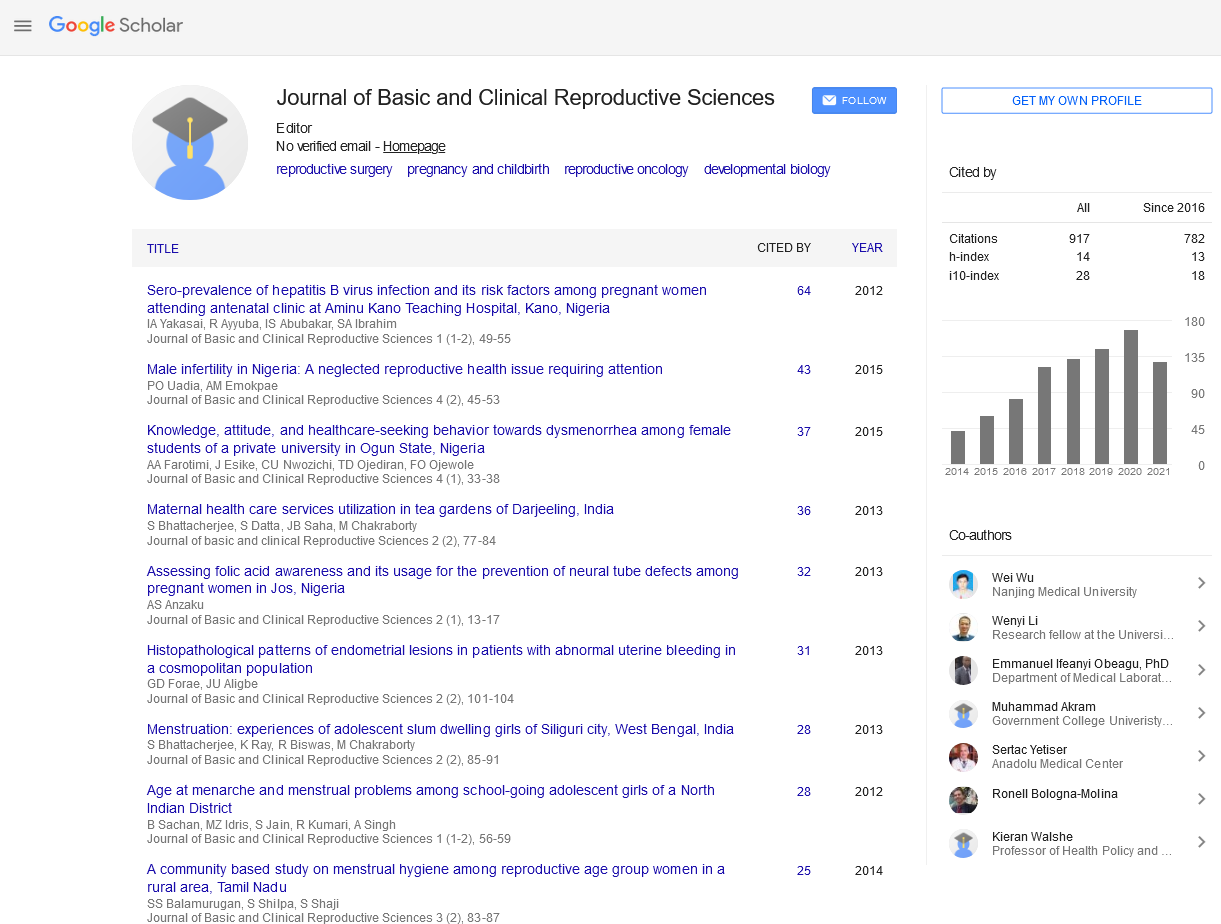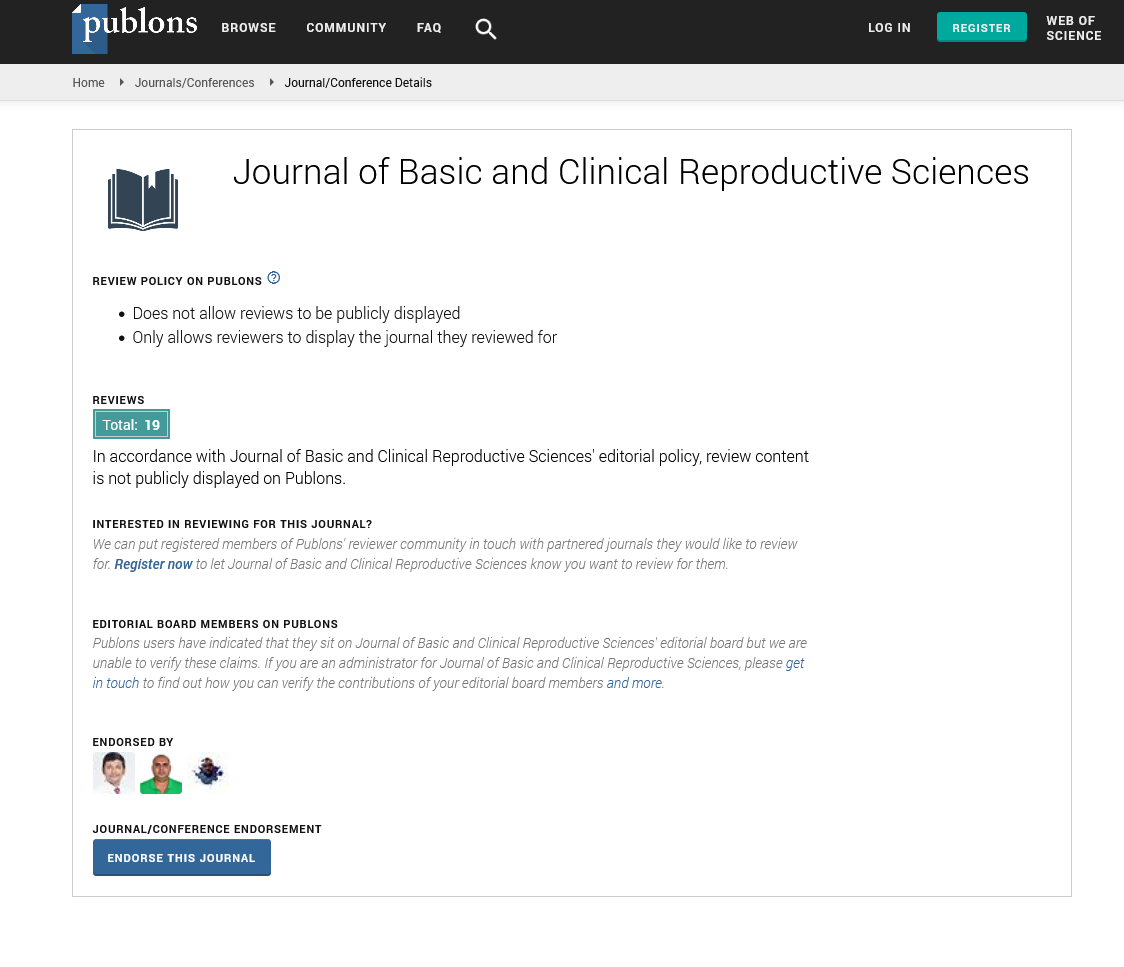Opinion - Journal of Basic and Clinical Reproductive Sciences (2023) Volume 12, Issue 1
Pregnancy, Birth, and Beyond: A Journey into Motherhood
Received: 10-Jan-2023, Manuscript No. JBCRS-23-96193; Editor assigned: 12-Jan-2023, Pre QC No. JBCRS-23-96193; Accepted Date: Feb 10, 2023 ; Reviewed: 23-Jan-2023 QC No. JBCRS-23-96193; Revised: 03-Feb-2023, Manuscript No. JBCRS-23-96193; Published: 10-Feb-2023
This open-access article is distributed under the terms of the Creative Commons Attribution Non-Commercial License (CC BY-NC) (http://creativecommons.org/licenses/by-nc/4.0/), which permits reuse, distribution and reproduction of the article, provided that the original work is properly cited and the reuse is restricted to noncommercial purposes. For commercial reuse, contact reprints@pulsus.com
Abstract
Description
Pregnancy and childbirth are profound and transformative experiences that transform a woman’s life in numerous ways. From the moment a woman discovers she is pregnant to the culmination of childbirth, this journey is filled with excitement, joy, challenges, and anticipation. It is a time of physical, emotional, and mental changes, as well as a period of preparation for motherhood. In this manuscript, we will explore the various stages of pregnancy and childbirth, discussing the physiological changes that occur in a woman’s body, the emotional and psychological aspects of pregnancy, and the significance of proper prenatal care in ensuring a healthy pregnancy and childbirth.
Epidemiology
HIV/AIDS is a global pandemic, with sub-Saharan Africa being the most affected region. However, it also has a significant impact on other parts of the world, including Asia, the Americas, and Eastern Europe. Despite significant progress in reducing new infections and AIDS-related deaths, HIV remains a major public health concern, particularly among key populations such as men who have sex with men, people who inject drugs, sex workers, transgender individuals, and people living in low-income and marginalized communities.
The first trimester of pregnancy, typically spanning from weeks 1 to 12, is a crucial period of fetal development. During this time, a woman’s body undergoes significant changes, including hormonal fluctuations, breast tenderness, fatigue, and morning sickness. The developing fetus goes through crucial developmental milestones, such as the formation of the placenta, the development of the heart, and the growth of major organs. It is essential for women to seek proper prenatal care during this time to monitor the progress of their pregnancy and address any potential complications.
As pregnancy progresses into the second trimester, which spans from weeks 13 to 27, many women experience a decrease in early pregnancy symptoms and an increase in energy levels. The baby’s movements become more apparent, and the mother may start to show a visible baby bump. It is also a time when the mother and her partner may choose to find out the sex of the baby through ultrasound. Along with physical changes, emotional and psychological adjustments also occur during this time, as the mother begins to bond with her growing baby and prepares for the impending arrival.
The third trimester, spanning from weeks 28 to 40 or beyond, is the final stage of pregnancy. The baby continues to grow and develop rapidly, and the mother’s body undergoes significant changes, including increased discomfort due to the size of the baby and pressure on internal organs. The mother may experience symptoms such as back pain, swelling, and difficulty sleeping. Regular prenatal check-ups become even more crucial during this time to monitor the baby’s position and growth, and to prepare for labor and delivery. Childbirth is the culmination of the journey of pregnancy, and it can be both awe-inspiring and challenging. Labor typically begins with contractions that increase in frequency and intensity, and the mother’s body goes through various stages of labor, including dilation, pushing, and delivery of the baby. Childbirth can be a physically demanding and emotionally intense experience, and it is essential for the mother to have a supportive birth team, including healthcare providers, partners, or doulas, to provide comfort, guidance, and care. After childbirth, the postpartum period begins, which is a time of recovery and adjustment for both the mother and the newborn. The mother’s body gradually returns to its pre-pregnancy state, but it may take time for her to fully recover physically and emotionally. Hormonal changes, sleep deprivation, and the demands of caring for a newborn can impact the mother’s emotional well-being. It is crucial for new mothers to prioritize self-care, seek support from loved ones, and communicate any concerns or difficulties to their healthcare providers. Pregnancy and childbirth are transformative experiences that bring about significant physical, emotional, and psychological changes in a woman’s life. Proper prenatal care, including regular check-ups, a healthy lifestyle, and emotional support, play a vital role in ensuring a healthy pregnancy and childbirth experience. Childbirth can be challenging, but with a supportive birth team and adequate preparation, it can also be a moment of empowerment and joy for the mother.


